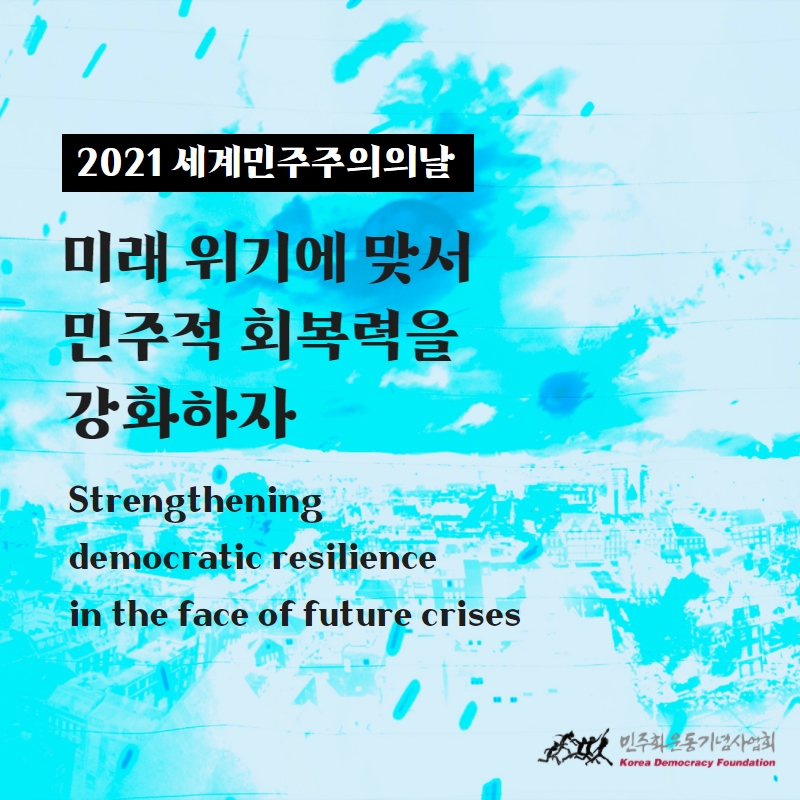2021 세계 민주주의의 날 메시지 (UN 사무총장 안토니오 구테헤스)
2021 세계민주주의의 날(International Day of Democracy)
미래 위기에 맞서 민주적 회복력을 강화하자

전 세계는 지금 코로나 사태에서 빠져나오기 위하여 사투를 벌이고 있습니다.
지난했던 18개월을 돌아보아야 하는 건, 앞으로 닥쳐올 위기 앞에서 민주적 회복 탄력성의 힘을 단련할 수 있는 교훈이 있기 때문입니다. 즉 공중보건, 환경, 금융 등 그 어떠한 긴급 상황에서도 훌륭한 거버넌스 활동을 찾고 개발해야 한다는 교훈입니다.
또한 곳곳에 만연한 젠더 불평등, 불충분한 보건 시스템, 그리고 백신·교육·인터넷·온라인 서비스에 대한 불평등한 접근에 이르기까지 코로나 위기로 드러난 세계적 불평등을 해결해야 합니다. 이러한 문제가 계속되는 지금, 가장 취약한 계층이 가장 큰 희생을 치르고 있으며 민주주의는 위협받고 있습니다.
민주주의가 단단하다는 말은 누구나 의사결정 과정에 적극적으로 참여할 수 있다는 뜻입니다.
과거 의사결정 과정에서 소외되었던 사람들과 공동체가 이제 자신의 목소리를 낼 수 있어야 합니다. 여성, 소수 종교와 소수 민족, 원주민 공동체, 장애인, 인권운동가, 언론인의 목소리가 막힌다면 건강한 사회로 나아가기 어렵습니다. 시민이 목소리를 낼 수 있는 공간이 실종된 상태에서 민주주의는 번영은커녕 생존하지도 못할 것입니다.
마지막으로, 민주주의 수호를 위해 코로나 사태의 고비가 잦아드는 대로 특수상황 대응을 위해 마련했던 임시적 권한과 법 조치를 단계적으로 철폐해야 합니다. 국가와 안전 담당 기관이 사태관리의 지름길을 제공하는 임시 권한에 의지하는 사례가 있습니다. 시간이 지나면 이와 같은 권한이 법체계로 스며들어 굳어질 수 있고, 그렇게 되면 법치주의와 인간의 기본 자유, 민주주의의 근간이 되는 인권이 훼손됩니다.
제가 코로나 사태가 정점을 찍었을 때 강조했다시피 모든 위기는 민주주의의 위협입니다.
인간의 권리, 특히 가장 취약한 사람들의 인권이 가장 먼저 무시되기 때문입니다. 이런 이유로 위기 상황이 닥쳤을 때 권리 보호는 인권에 관한 행동 촉구(Call to Action for Human Rights)의 핵심이 됩니다.
2021년 세계 민주주의의 날을 맞아 코로나 사태를 넘어 인권과 법치가 민주주의의 흔들리지 않는 토대가 되는 미래를 약속합시다. 또 다른 위기가 폭풍처럼 휘몰아쳐도 버틸 수 있도록 우리 모두 평등·참여·연대의 원칙을 수호합시다.
_UN 사무총장 안토니오 구테헤스(António Guterres)
[메시지 원본]
Secretary-General's message 2021
As the world struggles to emerge from the COVID-19 pandemic and its devastating consequences, we must learn from the lessons of the past 18 months to strengthen democratic resilience in the face of future crises. This means identifying and developing good governance practices in situations of emergency – whether public health, environmental or financial.
It means addressing the egregious global injustices laid bare by the crisis, from pervasive gender inequalities and inadequate health systems to unequal access to vaccines, education, the internet and online services. Along with the profound human toll borne by those most deprived, these persistent historical inequalities are themselves threats to democracy.
Strengthening democracy also means embracing genuine participation in decision-making -- including peaceful protests -- giving a real voice to people and communities that have traditionally been excluded. The silencing of women, religious and ethnic minorities, indigenous communities, people with disabilities, human rights defenders and journalists is an impediment to creating healthy societies. Democracy simply cannot survive, let alone flourish, in the absence of civic space.
Finally, safeguarding democracy means phasing out emergency powers and laws as the worst of the pandemic subsides. Some States and security sector institutions rely on emergency powers because they offer shortcuts. With time, such powers can seep into legal frameworks and become permanent, undermining the rule of law and consuming the fundamental freedoms and human rights that serve as a bedrock for democracy.
As I stressed at the height of the COVID-19 pandemic, every crisis poses a threat to democracy, because the rights of the people, in particular those most vulnerable, are all too quickly ignored. For this reason, protection of rights in times of crisis is a key element of my Call to Action for Human Rights.
On this International Day of Democracy, as we look beyond the COVID-19 pandemic, let us commit to a future in which we recognize human rights and the rule of law as fundamental to democracy. Let us commit to safeguarding the principles of equality, participation and solidarity, so that we can better weather the storm of future crises.

민주화운동기념사업회가 보유한 본 저작물은 "공공누리" 제 3유형 : 출처표시 + 변경금지 조건에 따라 이용 할 수 있습니다
